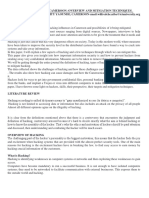0% found this document useful (0 votes)
7 views5 pagesHacking
Hacking involves unauthorized access to computers and networks, with motivations ranging from theft to ethical testing. There are different types of hackers, including White Hat (ethical), Black Hat (criminal), and Grey Hat (ambiguous intentions). Protecting against hacking requires strong passwords, software updates, and awareness of online threats.
Uploaded by
Ismail SalifuCopyright
© © All Rights Reserved
We take content rights seriously. If you suspect this is your content, claim it here.
Available Formats
Download as DOCX, PDF, TXT or read online on Scribd
0% found this document useful (0 votes)
7 views5 pagesHacking
Hacking involves unauthorized access to computers and networks, with motivations ranging from theft to ethical testing. There are different types of hackers, including White Hat (ethical), Black Hat (criminal), and Grey Hat (ambiguous intentions). Protecting against hacking requires strong passwords, software updates, and awareness of online threats.
Uploaded by
Ismail SalifuCopyright
© © All Rights Reserved
We take content rights seriously. If you suspect this is your content, claim it here.
Available Formats
Download as DOCX, PDF, TXT or read online on Scribd
/ 5












































































